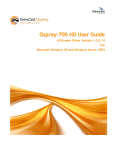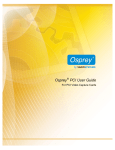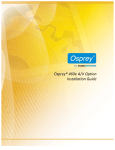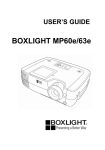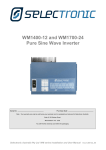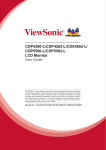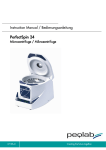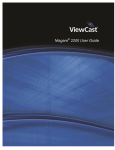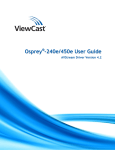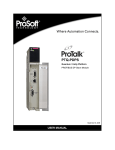Download Osprey 800e Series User Guide
Transcript
Osprey® 800e Series User Guide AVStream Driver Version 3.0 © 2014 Osprey by Variosystems. All rights reserved. Osprey® and SimulStream® are registered trademarks of Osprey Variosystems. Microsoft®, Windows® 7, Windows Server® 2003, AVStream®, DirectShow®, Intel® CoreDuo®, and Windows Media® Encoder are trademarks or registered trademarks of Microsoft Corporation. Any other product names, trademarks, trade names, service marks, or service names owned or registered by any other company and mentioned herein are the property of their respective companies. No part of this specification may be reproduced, transcribed, transmitted or stored in a retrieval system in any part or by any means without the express written consent of Osprey by Variosystems. Osprey by Variosystems reserves the right to change any products herein at any time and without notice. Osprey by Variosystems makes no representations or warranties regarding the content of this document, and assumes no responsibility for any errors contained herein. UL Statement Underwriters Laboratories Inc. has not tested the performance or reliability of the security or signaling aspects of this product. UL has only tested for fire, shock and casualty hazards as outlined in UL’s Standard for Safety UL 60950-1. UL Certification does not cover the performance or reliability of the security or signaling aspects of this product. UL MAKES NO REPRESENTATIONS, WARRANTIES OR CERTIFICATIONS WHATSOEVER REGARDING THE PERFORMANCE OR RELIABILITY OF ANY SECURITY OR SIGNALING RELATED FUNCTIONS OF THIS PRODUCT. To maintain UL compliance, this product is to be used only with UL Listed computers that include instructions for user-installed accessories. FCC Notice WARNING: Connections between this device and peripherals must be made using shielded cables in order to maintain compliance with FCC radio emission limits. WARNING: Modifications to this device not approved by Osprey by Variosystems could void the authority granted to the user by the FCC to operate the device. The Osprey 800e Series video capture device has been tested and found to comply with the limits for a Class B digital device, pursuant to Part 15 of the FCC Rules. These limits are designed to provide reasonable protection against harmful interference in a residential installation. This equipment generates, uses and can radiate radio frequency energy and, if not installed and used in accordance with the instructions, may cause harmful interference to radio communications. However, there is no guarantee that interference will not occur in a particular installation. If this device does cause harmful interference to radio or television reception, the user is encouraged to try to correct the interference by one or more of the following measures: Reorient or relocate the receiving antenna. Increase the separation between the equipment and receiver. Connect the computer into an outlet on a circuit different from that to which the receiver is connected. Consult the dealer or an experienced radio/TV technician for help. If the above measures are unsuccessful, please consult the dealer or manufacturer of your radio or television receiver, or speak with an experienced radio/TV technician. Note: This reminder is provided to call to the CATV installer’s attention Section 820-40 of the NEC, which provides guidelines for proper grounding and, in particular, specifies that the cable ground shall be connected to the grounding system of the building, as close to the point of cable entry as practical. Shielded Cables: Connections between this device and peripherals must be made using shielded cables in order to maintain compliance with FCC radio emission limits. Modifications: Modifications to this device not approved by Osprey by Variosystems could void the authority granted to the user by the FCC to operate the device. Note to CATV Installer: This reminder is provided to call to the CATV installer’s attention Section 820-40 of the NEC, which provides guidelines for proper grounding and, in particular, specifies that the cable ground shall be connected to the grounding system of the building, as close to the point of cable entry as practical. Product Disposal Information Dispose of this product in accordance with local and national disposal regulations (if any), including those governing the recovery and recycling of waste electrical and electronic equipment (WEEE). RoHS Compliant: Osprey by Variosystems is committed to compliance with the European directive on the Restriction of the Use of Certain Hazardous Substances in Electrical and Electronic Equipment, Directive 2002/95/EC, the RoHS directive. For current RoHS statement, visit www.ospreyvideo.com Osprey by Variosystems 901 S. Kimball Ave., Southlake, TX 76092 USA Osprey 800e Series User Guide Contents Overview .............................................................................................................................. 1 Warranties ....................................................................................................................................... 1 System requirements ....................................................................................................................... 2 Audience .......................................................................................................................................... 3 Installation Steps ................................................................................................................ 5 Installing the driver .......................................................................................................................... 5 Installing the hardware .................................................................................................................... 9 Installing the video capture card ................................................................................................... 12 Multiple board types...................................................................................................................... 13 Adding or moving boards ........................................................................................................ 13 Using the video capture card ......................................................................................................... 15 Designed for live/instant video-on-demand adaptive features .............................................. 16 Capture and preview pins ....................................................................................................... 16 Common buttons..................................................................................................................... 17 Setting Driver Properties .................................................................................................. 19 Properties window ......................................................................................................................... 19 Video Proc Amp tab................................................................................................................. 22 Video Decoder tab ................................................................................................................... 24 Crossbar tab............................................................................................................................. 26 Trace tab .................................................................................................................................. 27 Performance tab...................................................................................................................... 28 Diagnostics tab ........................................................................................................................ 30 Resource Monitor tab ............................................................................................................. 31 Device tab ................................................................................................................................ 33 Input Detect tab ...................................................................................................................... 34 Deinterlace tab ........................................................................................................................ 35 Watermark tab ........................................................................................................................ 37 Loss Of Signal tab..................................................................................................................... 40 Cropping tab ............................................................................................................................ 42 Closed Caption tab .................................................................................................................. 45 VGA Settings tab ...................................................................................................................... 47 Osprey by Variosystems iii Contents Selecting the audio source and input volume ................................................................. 49 Osprey mixer driver interface ........................................................................................................ 49 Osprey 800a audio input card........................................................................................................ 53 Appendix: Osprey Hardware Specifications ................................................................... 57 Ospery 800a audio input card........................................................................................................ 57 Osprey 820e video capture card .................................................................................................... 58 Osprey 825e video capture card .................................................................................................... 60 Osprey 845e video capture card .................................................................................................... 61 Index .................................................................................................................................. 63 iv Osprey by Variosystems Osprey 800e Series User Guide Overview Thank you for purchasing the Osprey® 800 series video capture card from Osprey by Variosystems. This user guide provides step-by-step instructions for installing and using your new video capture card. For the latest Osprey product information and news, visit our website at www.ospreyvideo.com. Warranties For complete warranty details, refer to the specific warranty included with each product. General warranty information includes the following: Limited Warranty Osprey by Variosystems warrants its hardware products against defects in material and workmanship under normal use for the period of one year (12 months) from date of sale. Where specific Osprey by Variosystems warranties exist that provide more substantial coverage, notwithstanding the warranty provisions herein, such product warranties control and preempt or supersede the warranty provisions herein. Reseller Pass Through of Standard Limited Warranties Resellers pass the Osprey by Variosystems standard limited warranties for the products through to the customer without modification. Any modification of a product voids the Osprey by Variosystems or any other existing or available warranty. Osprey by Variosystems 1 Overview System requirements The Osprey 800 series cards have been designed and undergone testing for use with 32- and 64-bit versions of Microsoft Windows XP SP3, Server 2003, Server 2008, and Windows 7 operating systems. Use this driver if you have an Osprey 800 series card. The Osprey high definition (HD) video capture cards require intense bandwidth across the system bus, CPU, and memory. The host computer system capabilities (CPU, RAM, and motherboard) must be capable of processing this amount of data. The following system requirements are required to achieve desired HD performance. Install the Osprey video capture card in a PCI Express® (PCIe®) slot with direct lanes to the CPU or a Northbridge or IOH. The selection of the CPU is critical. To process full HD video, a six-core processor per HD input is a good benchmark. Other important guidelines include: On the BIOS screen: o o Only enable hyper threading if the CPUs have 6 cores or more Set Power Options as follows: o o o o 2 Always disable C-States Power Scheme to Presentation Turn off Monitor to Never Turn off hard disks to Never System Standby to Never Osprey by Variosystems Setting Driver Properties Configure Performance Options as follows: o o Visual Effects adjusted for best performance Memory Usage to System Cache (for Windows XP only) Audience The audience for this user guide includes anyone who uses or administers the Osprey 800 series. Users should have a basic technical understanding of streaming media. This user guide provides information on the Osprey 800 series only. Osprey by Variosystems 3 Osprey 800e Series User Guide Installation Steps The most efficient and complete installation method is to run the Setup.exe program or msi installation file on the product CD or in the web package that you download. The installation program automates the steps required to install the driver and ensures you perform the steps correctly. The driver is unique to the Osprey 800 series in the same operating system; it will not automatically configure other Osprey models. You will need to configure other cards separately. These installation steps are the steps Osprey by Variosystems recommends if you install an Osprey video capture card on a system for the first time. After the install is run, the card is detected and its drivers automatically start. Note: Before you install Osprey software updates, uninstall the driver software and reboot the computer. Installing the driver 1. Insert the Osprey software CD in the CDRom drive of the computer. If autoplay is enabled, the main menu for the Osprey software CD automatically appears. Note: Autoplay should be enabled by default. If the main menu does not automatically appear, click on Start Computer. Double-click on the DVD in the window. 2. 3. Follow the directions in the CD menu. The InstallShield Wizard appears and guides you through the installation process. The Remove Previous Installations window displays. Figure 1. Remove Previous Installations window Click OK. The End User License Agreement displays. Osprey by Variosystems 5 Installation Steps 4. Select I accept the terms in the license agreement. Figure 2. End-User License Agreement 5. Click Next. A Destination Folder window appears indicating the folder in which the driver will be installed by default. To change the location of the destination folder, click Change to browse for a different location. If this destination folder is okay, click Next. Figure 3. Destination Folder window The Setup Type window appears. 6 Osprey by Variosystems Osprey 800e Series User Guide 6. Click Install. Figure 4. Ready to Install the Program window The Installing Osprey 800e window appears. Note: This window shows the progress of the installation. If during the installation, warning windows appear regarding Windows Logo Testing, the user should click Continue Anyway to proceed with the installation. Figure 5. Installing Osprey 800e HDx86 window Figure 6. Software Installation window Osprey by Variosystems 7 Installation Steps 7. 8. 8 Click Finish when the InstallShield Wizard Completed window appears. When the installation is complete, completely shut down the computer on which the driver has been installed. Osprey by Variosystems Osprey 800e Series User Guide Installing the hardware After you install the Osprey 800 series driver, physically install the video capture card into the computer. The appropriate InstallShield Wizard appears and guides you through the installation process. 1. A Welcome window appears. Click No, not this time. Figure 7. Welcome window 2. Click Next. 3. On the next window, click Install the software automatically (Recommended). Figure 8. Install Software Automatically window Note: The device name will vary depending on which card you are installing. Osprey by Variosystems 9 Installation Steps 4. Click Next. The installation begins and the Found New Hardware Wizard window appears. Figure 9. Found New Hardware Wizard window A warning window appears regarding Windows Logo Testing. 5. Click Continue Anyway. Figure 10. Warning window The Found New Hardware Wizard window remains on the computer screen while the installation continues. Figure 11. Found New Hardware Wizard window 10 Osprey by Variosystems Osprey 800e Series User Guide 6. The Completing the Found New Hardware Wizard appears. Click Finish. Figure 12. Completing the Found New Hardware Wizard window Osprey by Variosystems 11 Installation Steps Installing the video capture card All computer cards are sensitive to electrostatic discharge. Slight electrostatic discharges from clothing or from the normal work environment can adversely affect these cards. By following these simple guidelines, however, you can minimize the chance of damaging the Osprey video capture card. Handle cards only by the non-conducting edges. Do not touch the card components or any other metal parts. Wear a grounding strap while handling the cards (especially when located in a high static area). Properly ground your computer to avoid static discharge. Ensure the workstation is powered off before installing any components. If you are not familiar with how to install a PCI Express bus card, refer to the system’s documentation for more complete, step-by-step instructions. Install the card only in UL Listed computers that include instructions for user-installed accessories. 1. Power down and unplug your computer. 2. Remove the computer’s cover and locate an empty PCI Express slot. WARNING! Be sure to install the card in the PCI Express slot. This slot is usually black. Refer to the following diagram as a guide. Placing the card in the wrong slot can damage the card. Figure 13. Typical PCI Express Slot diagram 3. 4. 5. 6. Remove the cover screw from the empty PCI Express slot’s cover, set the screw aside. Remove the slot cover. Remove the Osprey video capture card from its anti-static bag. Insert the Osprey card into the desired PCI Express slot and make sure it is seated evenly. Note: The slot must be x4 or higher. 7. Secure the back panel of the card with the slot’s cover screw. 8. Replace the computer cover. 9. Plug the power cord into an electrical outlet and turn the computer on. 12 Osprey by Variosystems Osprey 800e Series User Guide Multiple board types All Osprey video capture cards are designed to co-exist with other Osprey cards within practical limits of slot placement, available power, and the upper limits of system and CPU performance. There are eight classes of Osprey devices. Each class requires its own Windows driver. class 1: o100, o200, o210, o220, o230 class 2: o300 class 3: o440 class 4: o530, o540, o560 class 5: o700e HD and 0710e HD class 6: o240e, o450e class 7: o100e, o260e, o460e class 8: o820e, o825e, o845e This user guide applies only to class 8. For example, if you install an Osprey 240e and an Osprey 845e series in the same computer, you must install separate drivers for each board. Adding or moving boards When you add or move boards after you install the Osprey 845e driver, the following two scenarios exist. A. B. You added a board of a different class to a computer that already contains another board. For example, an Osprey 240e is already installed with its current driver on the computer. You want to add an Osprey 845e card. You must install the driver installation package for the new board to work. You moved a board from one slot to another, or added another board of the same type. For example, an Osprey 240e card is installed in the computer, and you want to install another Osprey 240e card. In this case, the following sequence takes place. 1. 2. 3. 4. 5. 6. 7. The New Hardware Wizard runs and the Found New Hardware window appears followed by the Digital Signature Not Found window. Click Continue Anyway. (The Digital Signature Not Found window will only display on drivers that have not been WHQL certified. WHQL-certified drivers skip this step.) The Controller Installing window appears, and the text inside this window changes to Osprey Video Capture Device, Installing … Then the Digital Signature Not Found window appears. Click Continue Anyway. (Again, the Digital Signature Not Found window will only display on drivers that have not been WHQL-certified. WHQL-certified drivers skip this step. The Completing the Found New Hardware window displays. Click Finish. The Digital Signature Not Found window appears. The Digital Signature Not Found window appears once for each Osprey board you install. The Systems Setting Change window appears. Osprey by Variosystems 13 Installation Steps 8. 9. 14 Click Finish to restart the computer. The Osprey 800 series card is now ready for use. Osprey by Variosystems Osprey 800e Series User Guide Using the video capture card The Osprey 800 series is a high-definition (HD) video capture card. The card has significant operational differences from other cards that fall under the standard-definition Osprey card family including advanced features to accommodate the many input video standards that are part of the HD experience and to adapt automatically to input signal types dynamically, a common need in the HD environment. The card has the following controls: VGA Settings (Osprey 820e only) Video Proc Amp Video Decoder Crossbar Trace Performance Diagnostics Device Input Detect Deinterlace Watermark Loss Of Signal Cropping Closed Caption Resource Monitor The Osprey 800e series includes a special version of Osprey SimulStream that allows you to “virtualize” the entire feature set of the card. That is, the card can simultaneously feed more than one capture/encode application or multiple instances of the same application, from the same controls can be set separately for each capture stream below: Crop Logo Captions With the Osprey 800 series, all of the above features can be set individually. Each application receives its own full set of identical Property settings tabs. Another significant operational difference of the Osprey 800 series and other Osprey cards is that in the Osprey 800e series each stream is configured separately. As a result, the second and subsequent streams may appear to have randomly changing defaults. For example, if you originate Instance 1 of Windows Media® Encoder (WME) rather than from a previously named and saved settings file, and you configure the encoder for a 720P WME stream with a watermark (for example, a logo) in the lower-right corner of the screen. When you originate a second instance of WME, WME adopts the same settings, including the same watermark in the same position, as the stream created before it. This situation occurs because, in the second instance, the WME was not started from a saved settings file. Therefore, the WME was forced to assign default settings, and adopted the most recently configured stream. If, in the second instance, you need to create different configuration settings, you should modify the settings, save the WME, and name it something other than in Instance 1 – a unique file with a different name. Osprey by Variosystems 15 Installation Steps Designed for live/instant video-on-demand adaptive features An important feature of the Osprey digital HD capture cards is the ability to adapt automatically to input signal format changes without having to stop, to reconfigure, and to restart the video application run by the card. The “designed for live” feature distinguishes the Osprey digital HD capture cards from cards used for ingesting video into video editing systems or other applications. With the Osprey digital HD capture cards, you can create the following events: Switch on-the-fly between SD and HD – The Osprey 820e accepts SD and HD analog video, VGA, DVI and HDMI standards and automatically re-syncs while the Osprey 845e accepts SD and HD digital video and automatically re-syncs; without interruption, when the signal formats change between any of the supported SD and HD modes. Reduce and eradicate post-production work – Minimize or eliminate post-production work to make a live broadcast available as Instant VODTM (Instant Video-on-Demand) at the end of the broadcast by encoding a Save-to-File version of the live stream. The stream can be configured with its own watermark if desired. Create anything-in something-out video – One of the most popular applications of the Osprey digital HD capture cards is to accept SD and HD input for live Internet video streaming. Generally, the expected viewing experience is for the viewing window to have fixed dimensions regardless of the aspect ratio or pixel count of the incoming video. Most of the popular video encoders require that these parameters not change during the encoding session. The Osprey 800 series cards can automatically adapt, through size and scale, the incoming video to match the selected output parameters. For example, a broadcaster can freely switch sequences between a live HD studio feed, and SD promo clip form a payout server and then return to live HD 24 hours a day, 7 days a week. Capture and preview pins Some applications use DirectShow Pin Properties with Osprey cards. For Capture and Preview pins, these properties are always per pin. At the top of several Osprey 800 series Property tabs is the Pin Type field with a drop-down list. The drop-down list in Figure 14 has Capture, Preview, and Both. This selection works similarly to other Osprey models, which typically enable these selections using radio buttons. Figure 14. Pin type list box The three choices, Capture, Preview, and Both, provide the opportunity to determine whether the changes you make on the Property tab should apply to both the capture and preview pins associated with the other controls on the page, or just the desired pin – Capture or Preview. Decide what type of pin to select based on several criteria. Software applications that use Osprey video capture cards and AV stream drivers communicate with the hardware via a Microsoftdeveloped software layer named DirectShow®. DirectShow is a collection of software objects, or object library, for working with video, audio, and other multimedia data. The object library primarily consists of filters – objects that process video and audio data and are connected or chained together into filter graphs. 16 Osprey by Variosystems Osprey 800e Series User Guide For example, Osprey designs filters that are included in all Osprey AV stream drivers and interface with the capture hardware to grab-digitized frames of video. These filters then process video streams and pass them to target software applications like Windows Media Encoder. Other filters are associated with previewing or displaying video that decode video and render video to the screen. Filters usually have inputs and outputs and are interconnected programmatically as needed. The input and output connections are referred to as pins. The pins most important to you are the Capture Output pin and the Preview Output pin. Generally, captured audio and video to be fed to the encoder is taken from the Capture pin, while video for local preview, such as the Input Video window in the Windows Media Controller dashboard, will usually use the Preview pin. In most cases, the Preview pin has a lower priority in the video processing engine. If the host PC is nearing its upper performance margin where video quality could be compromised, it is preferable to sacrifice quality or drop frames in the Preview output in favor of sustaining quality of the Capture pin’s output. Exposing these pins separately in Osprey drivers allows you to balance your needs with the host computer’s performance and the video application’s features. You may apply a low-effort de-interlacing process to a preview window to save CPU cycle, and apply a more CPU intensive Advanced Motion Adaptive De-interlacing process to the captured stream for maximum video quality. Like other Osprey cards, the Osprey 800 series enables you to define various setups for the two pins. For example, you can choose to include a logo in the capture pin’s video, but not in the Preview output. When you click Capture, the current logo settings for the Capture pin are loaded, and the changes you make apply only to the Capture pin, not to the Preview pin. The Preview button works in the same manner. Common buttons The following information applies to controls that are not interactive. OK Commits the changes you have made on the currently displayed page, and exits the dialog. Cancel Exits the window without committing the changes you have made on the currently displayed page. Changes made before the most recent click of Apply are not cancelled. Apply Commits the changes you have made on the currently displayed page, without exiting the dialog. Some controls are interactive – changes you make are immediately updated on the video. Examples are the brightness, contrast, hue, saturation, and sharpness controls, the graphical gamma control; and the graphical sizing and positioning controls for logos. OK, Cancel, and Apply have no effect on these controls. In all cases, Help accesses the help module. Note: OK and Apply commit only the changes on the currently displayed page. To set changes on three different pages, you need to click Apply twice and OK once. Osprey by Variosystems 17 Osprey 800e Series User Guide Setting Driver Properties After you have installed the Osprey 800 series card and driver, you will be able to access the properties for the card through most major DirectShow applications (such as Windows Media Encoder and Flash Media Encoder). For detailed information on how to select the Osprey card and access its Video Properties window from third-party applications, refer to the documentation for the encoding application. Note: Most of these encoding applications expose the drivers’ Property tabs without modification, so the examples set forth below will probably appear as shown. However, some applications expose the Property tabs slightly differently. Therefore, the examples below may differ somewhat. Properties window When your video application, such as WME, is invited to expose the Osprey 800 series card’s videorelated property pages—usually by navigating to the Properties page—a window appears entitled Properties (Figure 15). Other applications display the same window, but it is entitled Osprey 820e/845e Video Capture Device(x) Properties. The “x” is the target installed Osprey 820e, 825e, or 845e card. This number is always 1 if only one Osprey 820e, 825e, or 845e card is installed. Osprey by Variosystems 19 Setting Driver Properties Figure 15. Osprey 800 Series Video Properties The tabs are as follows: Video Proc Amp The Video Process Amplifier (Video Proc Amp) tab lets you control Gamma, Brightness, Contrast, Hue, and Saturation. Video Decoder This tab is a Microsoft DirectShow standard control for setting the video standard. Crossbar The Crossbar tab lets you select from multiple inputs. Trace Sets error logging controls. Performance Sets the pin centric settings. Diagnostics Sets Osprey 800 series internal test controls. The user should only use these controls when instructed by Osprey support. Doing so without proper instructions might result in system instability or in the system crashing. Resource Monitor Displays PCIe states and buffer activity. Device Displays product information. Input Detect Describes the signal coming into the card. 20 Osprey by Variosystems Osprey 800e Series User Guide Deinterlace Sets de-interlacing properties. Watermark Sets up on video logos. Loss Of Signal Enables video overlay. Cropping Enables cropping, sets the cropping rectangle. Closed Caption Sets closed caption rendering. VGA Settings This tab is only on the Osprey 820e. The VGA Settings tab lets you enter the video graphics adapter (VGA) entry information. In some applications, additional tabs other than those listed above may appear. The additional tabs are application- or system-supplied, and are intended for information only. The additional tabs generally contain no controls that can be changed. Note: Some controls are interactive. For example, changes you make are updated immediately in the captured video. Such examples are the Brightness, Contract, Hue, and Saturation, controls, graphical Gamma control, and graphical sizing and positioning controls for watermarks/logos. The OK, Cancel, and Apply buttons have no effect on these controls. The OK and Apply buttons pertain only to changes on the currently displayed tab. Osprey by Variosystems 21 Setting Driver Properties Video Proc Amp tab Video Proc Amp stands for Video Process Amplifier. Use the Video Proc Amp tab (Figure 16) to control various characteristics of streaming output. Figure 16. Video Proc Amp tab 22 Osprey by Variosystems Osprey 800e Series User Guide Gamma correction controls The Gamma slider and control adjusts the gamma of the incoming video. Gamma refers to the response curve of video cameras and CRTs. When video is captured through a camera, the response of the camera is deliberately nonlinear—low lumen values are boosted, and high lumen values are compressed. This process is done for two reasons. It increases the effective bandwidth in the low lumen range, where it is needed, at the expense of the high lumen range, where it is needed less. It matches the response characteristics of TV sets and monitors. The calibration specified in video standards matches the requirements of cameras and television sets in broadcast use, but generally does not match the needs of computer-based applications or the response curves of computer monitors. Therefore, a correction inverse to the original bias is often needed, and you may want to adjust the gamma for the characteristics of a particular monitor. Note: When gamma correction is disabled, either by setting the Gamma to Neutral or by setting the Gamma correction value to exactly 100, the software-based Gamma filter works in passthrough mode with no effect on the video and without using processing bandwidth. When Gamma correction is enabled, the factor applied is as shown in the slider text box and in the graphic. If you are running preview video while adjusting the filter, you will see the effects of your adjustments as you make the adjustments. The Video Proc Amp tab also has the following controls. Pin Type The drop-down list has three choices. See Capture and preview pins for information on how this selection works. Gamma correction controls The slider controls are used to set Gamma, Brightness, Contrast, Hue, and Saturation. (The Hue slider is disabled when PAL is selected.) All slider values are applied real time. For example, if Preview or real-time capture-to-screen video is running when you access the Preview tab, you can see adjustments as you make changes. Individual Restore buttons return the respective slider to the settings as set when the dialog box is opened. An adjustment scale is also included to identify each slider’s relative position. Note: If you change the video standard or video input you will not see any changes in the slider controls until the driver properties dialog is closed and re-opened. Reset Values Click this button to reset all slide controls simultaneously to the state they were in when the dialog box was opened. Neutral Click this button to reset all slide controls simultaneously to the original factory default settings. These defaults are considered neutral, that is, the controls are set to positions that pass through the incoming video without modification. Start Preview Click to view the gamma settings in real time. You can see adjustments as you make changes. Stop Preview Stops the preview. Vector Scope Click this button to view the vector scope. Luma Scope Click this button to view the luma scope. Osprey by Variosystems 23 Setting Driver Properties Video Decoder tab The Video Decoder tab exposes the incoming video signal format. PAL and SECAM are standards used in Europe and other parts of the world. Osprey cards can function in computers in various countries with different standards. Osprey 800 series Osprey 820e only NTSC HD 1035 PAL 483 HD 720 VGA HD 1080 SECAM The selection should be set to match the incoming signal’s primary mode. Although the Osprey 800 series board automatically senses and adjusts to incoming signals, including switching between SD and HD modes, setting the incoming signal’s primary mode is advisable to avoid the slight delay that results from evaluating and re-syncing to changes of input signal timing. Figure 17. Video Decoder tab The Video Decoder tab has the following controls. 24 Osprey by Variosystems Osprey 800e Series User Guide Reference Format The value selected in Reference Format is what you should expect the input video to be. Whatever you select here displays on other tabs in the Reference Size text boxes. Once you make the selection on the Video Decoder tab, you must go to the other tabs (Watermark or Cropping) and click the Reset Reference button so the Reference Size text box is updated to the size corresponding to that chosen on the Video Decoder tab. Detected Format This field lists the detected format. Osprey by Variosystems 25 Setting Driver Properties Crossbar tab Use the Crossbar tab (Figure 18) to set the input and output settings. Figure 18. Crossbar tab The Crossbar tab has the following controls. Input Click on the input source from the drop-down list. Output Click on the output source from the drop-down list. 26 Osprey by Variosystems Osprey 800e Series User Guide Trace tab Use the Trace tab (Figure 19) to create trace events for diagnostic debugging and subsequent logging to file. These settings are normally disabled. An authorized Osprey support representative may ask you to change these settings should you experience problems using the Osprey 800 series with a video application. The selection that is enabled is added to the time log. Figure 19. Trace tab WARNING! Leaving the Log file enabled can result in a large file that consumes all available disk space. Osprey by Variosystems 27 Setting Driver Properties Performance tab Use the Performance tab (Figure 20) to set the pin centric settings. These properties are global for all devices. Changes made on this window will not take effect until the video capture filter is recreated in the supporting application. Figure 20. Performance tab The Performance tab has the following controls. Pin Type The drop-down list has three choices (see Capture and preview pins). Video Scaling Algorithm Select the video scaling algorithm from the drop-down menu. Default Video Input Size Select the default video input size from the drop-down menu to scale the incoming video. Note: Cubic and Lanczos are CPU intensive and are not recommended for high definition. Note: These values are only used if the application does not explicitly request a specific resolution. Width 28 Select the width of the input from the drop-down list. Osprey by Variosystems Osprey 800e Series User Guide Height Select the height of the input from the drop-down list. Video Buffers Select the number of buffers to pass to the DirectShow filter from the dropdown list. Default Frame Rate This field is only on the Osprey 845e. It displays the frame rate sent to the application. You can change the frame rate if needed. Note: These values are only used if the application does not explicitly request a specific resolution. Input pin mode Displays the input port setting. Remove VBI lines from video Indicate the number of VBI lines that are passed through after the start of the video. Enable 3G SDI support This field is only on the Osprey 845e. Select this check box to enable 3G SDI support. Enabling this feature will disable SDI inputs C and D. Osprey 845e: When using the Remove VBI lines from video and Enable 3G SDI support fields, you need to restart the driver for changes to take effect. Osprey by Variosystems 29 Setting Driver Properties Diagnostics tab Use the Diagnostics tab (Figure 21) to run certain internal self-tests for diagnostic debugging purposes. These settings are normally disabled. An authorized Osprey support representative may ask you to change these settings should you experience problems using the Osprey 800 series with a video application. Figure 21. Diagnostics tab WARNING! You should not enable these settings without specific instructions from Osprey support. Doing so without proper instructions might result in system instability or in the system crashing. 30 Osprey by Variosystems Osprey 800e Series User Guide Resource Monitor tab Use the Resource Monitor tab (Figure 22) to view PCIe states and buffer activity. Figure 22. Resource Monitor tab The Resource Monitor tab has the following fields. PCIe Packet Size The packet size of the PCIe. Video FIFO size The size of the first in, first out (FIFO) video. Threshold The threshold for the video. Audio FIFO size The size of the FIFO audio. Threshold The threshold of the audio. Interrupt Count The number of interruptions. Interrupts Per Second The number of interruptions per second. MFI-X or SDI-X The video and audio FIFO activity for the particular input. The activity displays as current and what it peaked at. External Audio 1 This field is only on the Osprey 820e. The FIFO activity on the analog unbalanced Osprey by Variosystems 31 Setting Driver Properties pair 1. The activity displays as current and what it peaked at. Note: Since the external audio is an analog sample, it may always show activity. 32 Osprey by Variosystems Osprey 800e Series User Guide Device tab The Device tab (Figure 23) tab displays product information. Figure 23. Device tab The Device tab has the following fields. Name Product name Driver Version Indicates the version of the driver. Product Information Displays the vendor ID, device ID, serial number, facility ID, date and time. PCI Information Displays the bus and device number. Features Displays the features available on the driver. Osprey by Variosystems 33 Setting Driver Properties Input Detect tab The Input Detect tab (Figure 24) displays the signal properties of what the card detects as the input signal. Figure 24. Input Detect tab 34 Osprey by Variosystems Osprey 800e Series User Guide Deinterlace tab Use the Deinterlace tab (Figure 25) to turn deinterlacing on or off, select a desired operating mode, and instruct the card to detect telecined content, and apply appropriate compensation. Figure 25. Deinterlace tab Advanced motion adaptive deinterlace Motion adaptive deinterlace is an algorithm for deinterlacing pure video (non-telecine) content. Motion adaptive deinterlace detects which portions of the image are still, and which portions are in motion, and applies different processing to each. This can be somewhat CPU-intensive but is helpful when the video consists of high-motion content. Simpler Bob and Weave algorithms can be employed when video is relatively stationary, with a slight loss of sharpness. In some cases, such as when the desired output frame vertical dimension is exactly half of the incoming dimensions, it may be unnecessary to select deinterlacing—the scaling algorithm simply drops odd or even frames, that is, drops the odd or even lines altogether to achieve the scaling. Once you enable deinterlacing via the check box, you may select which algorithm to use: Bob 0 Bob 1 Osprey by Variosystems 35 Setting Driver Properties Advanced There are two fields per interlaced frame, odd and even. Bob 0 is for Field 0 (even) and Bob 1 is for Field 1 (odd). If the signal coming in is progressive, these settings have no effect. Clicking Advanced forces the advanced motion-adaptive algorithm to deinterlace incoming video. Telecine and inverse telecine The dialog box allows you to enable or disable Inverse Telecine. When Inverse Telecine is enabled, the following options are available: Auto-detect Telecine Source Enable Frame Resync Resync Interval Telecine video is NTSC video originally created on movie film at the industry-standard 24 framesper-second rate. Since standard NTSC video has a near-30 frame-per-second rate, in the telecine conversion process from 24 frames to 30 frames-per-second, certain fields are repeated in a regular, recurring sequence. If a telecined sequence is viewed directly on a progressive screen, as is usually the case, and you stream video to a computer screen, interlacing artifacts will be visible. The process called Inverse Telecine is the reverse of Telecine. Telecine drops the redundant fields and reassembles the video into a 24 frames-per-second progressive format. Interlacing artifacts are 100 percent removed. If the video is viewed at 24 frames-per-second, you will see the exact timing and sequencing that was on the original film. If you view the video at 30 frames-per-second, every fifth frame is repeated; however, no deinterlacing artifacts exist. Telecine and inverse telecine are not used for PAL video. The Auto and Inverse Telecine buttons will be ignored when PAL or any HD mode is selected as the video standard. The Deinterlace tab has the following controls: Pin Type The drop-down list has three choices (see Capture and preview pins). De-Interlace Enable deinterlacing and select: Inverse Telecine Bob 0 Bob 1 Advanced Enable inverse telecine and select: Auto-detect Telecine Source Enable Frame Resync Start Preview Click to view the preview. Stop Preview Click to stop the preview. 36 Osprey by Variosystems Osprey 800e Series User Guide Watermark tab Use the Watermark tab (Figure 26) to enable, disable, and position a graphic anywhere in the video capture window. A watermark might be any properly formatted bitmap of appropriate size. Typically, the graphic is a network / affiliate logo, an advertisement, or some promotional bitmap positioned near the lower-right corner of the screen. You can also use the Watermark tab to select the desired bitmap file and adjust transparency. Figure 26. Watermark tab Watermarks are often used as logos, and have the following characteristics: Any RGB-24 bitmap (.bmp) can be used. A selectable key color can be specified; all parts of the Watermark graphic with that color are not drawn on the video. A transparency control can be used to blend the Watermark graphic with the background video. The Watermark appears on both captured and previewed video. If the capture and preview video are different sizes, the logo is scaled to look the same on the preview video when the Pin type of both has been selected and the user has set different properties for Capture and for Preview. The Watermark property controls work best when the preview video is running and is viewed using the Start Preview button. With preview video running, you can preview your changes dynamically. If your application displays capture video in real time, capture video can be used instead. Osprey by Variosystems 37 Setting Driver Properties The Watermark properties are organized into four areas: File Position Color Transparency The Watermark tab has the following controls. Pin Type The drop-down list has three choices (see Capture and preview pins). When you select Both in the Pin Type drop-down box, changes you make to the Watermark setup apply to both the Capture and Preview pins. You can enable different setups for the pins. For example, you can enable the logo on the Capture pin but not on the Preview pin, and thereby save CPU time. When you select Capture in the Pin Type drop-down list, the current logo settings for the Capture pin are loaded, and changes you make apply only to the Capture pin, not to the Preview pin. The Preview button works analogously. Enable Watermark Enable or disable logos. If you disable logos, all of your other Watermark settings are retained for when you re-enable logos. Watermark File Click the browse button at the end of the field to browse for a file. Watermark files must be in (1) .bmp format with a .bmp filename extension and (2) RGB-24 format. Note: If you have a graphic that is in another format, you will need to edit the graphic with a drawing or photo edit program, such as Windows Paint, and save the graphic in a RGB24 format. Top, Left, Height, Width The Watermark Position and Size controls allow you to position and scale the watermark, similar to the process on the Cropping tab. Osprey by Variosystems strongly recommends you have live or preview video running when you use these controls. The background/preview window represents the video area where you can position the logo. The selected bitmap graphic appears when the Enable Watermark checkbox is checked and a suitable bitmap has been loaded. To position the logo, you must click on the logo rectangle and drag it to the new position. The four “nudge” spin-buttons, Top, Left, Height, and Width, position the logo exactly one pixel at a time on the output video to help you position the watermark precisely after a drag-and-drop operation. The Up and Down buttons change the position and the size of the watermark. Enable Key Color The key color is the color that disappears from the graphic so the underlying video shows through unchanged. If Enable Key Color is disabled, all colors display. Alternatively, if Enable Key Color is enabled, key coloring is activated. The user can adjust the three edit boxes, Red, Green, and Blue, to enter any RGB color value into these boxes. You control the key color and the transparency effects of the watermark. If preview video is running, you will dynamically see your changes. 38 Osprey by Variosystems Osprey 800e Series User Guide Reference Size Display Size Granularity These fields refer to the size of the video. Reset Reference The Reference Size text box displays whatever you have selected on the Video Decoder tab as the expected input. After making the selection on the Video Decoder tab, click the Reset Reference button to update the value in the Reset Reference text box. Transparency The degree of transparency of the watermark is variable through use of a zero to 100 percent scale. If the setting is zero, the logo is opaque. If the setting nears 100 percent, the watermark is completely transparent. If you set a keycolor, the transparency value is applied only to pixels that do not match the keycolor and, therefore, are completely transparent. 2x Watermark 1x Watermark These buttons adjust the size of the bitmap graphic. The quality of a scaled image will not be as exceptional as the quality of the 1X image. Osprey by Variosystems recommends that, wherever possible for production work, you should prepare the artwork to the exact size at which it will be used. Start Preview Preview the Watermark as it is positioned and scaled. Stop Preview If you press Stop Preview while in Preview mode, the original background graphic in the Crop window is restored. Note: When incoming video modes switch on-the-fly, such as when you switch from SD to HD and back, the watermark size and position is recalculated automatically and, if necessary, is scaled to force the watermark to remain in the same position relative to the lower-right corner. This function is exclusive to the Designed-for-Live feature of the Osprey digital HD capture cards. Osprey by Variosystems 39 Setting Driver Properties Loss Of Signal tab When the incoming video signal is lost, the Osprey 800 series capture card detects the signal loss. Use the Loss Of Signal tab (Figure 27) to overlay a video that can replace the incoming signal when it is lost. This feature allows you to continue streaming video to an encoder without interruption. It also can be helpful to identify your source when using multiple systems. Figure 27. Loss Of Signal tab 40 Osprey by Variosystems Osprey 800e Series User Guide The Loss Of Signal tab has the following controls. Generated Audio Select the audio generated on the odd and even channels from the drop-down list. Generated Video Select the video overlay that will appear if the signal is lost. Enable Video Overlay Enable the video overlay that replaces the incoming signal when it is lost. Font Click Font to enter the font, the style of the font, and the point size. Caption Enter a caption. Top, Left, Height, Width Use the up and down arrows to position the overlay. Text Color Enable a text color. Reference Size Display Size Granularity These fields refer to the size of the overlay. Reset Reference The Reference Size text box displays whatever you have selected on the Video Decoder tab as whatever their expected input is. After making the selection on the Video Decoder tab, you then click the Reset Reference button to update the value in the Reset Reference text box. Start Preview Click to view the video overlay. Stop Preview Click to stop the preview. Osprey by Variosystems 41 Setting Driver Properties Cropping tab Use the Cropping tab (Figure 28) to enable and disable cropping and set the desired cropping rectangle. Cropping means removal of unwanted video around the edges of the incoming image. For example, if the incoming video is letterboxed, with an aspect ratio wider than 4:3, you can crop away video at the top and bottom of the image and capture just the active portion. The Left and Width controls are used to crop the left and right sides of the video. Note: This type of cropping is different from the final desired Display size that is usually set by the application software that negotiates with the driver to deliver the desired output. The Display size is the size of the Osprey graphic in the dialog box. It is used to understand the size ratios versus the video appearance between the Reference size (incoming signal), what you see in the dialog box (Display size), and what appears at the client, i.e., such as Windows Media Encoder. Figure 28. Cropping tab 42 Osprey by Variosystems Osprey 800e Series User Guide The Cropping tab has the following controls: Pin Type The drop-down list has three choices: Capture Preview Both Changes made on this page separately apply to Video Preview and Capture Pins on the currently selected device, as determined by the Pin Type drop-down list. When you select Both from the drop-down list, changes you make to the crop setup apply to the Capture and Preview pins. For example, you may need to create different setups for the Capture and Preview pins. To do this, you would enable cropping with both pins, and then create different settings for each pin. Enable Cropping Enables the ability to crop borders from the incoming video. When you enable this field, the crop sizing controls are enabled. When this field is disabled, the incoming video is unchanged. Top, Left, Height, Width Use the up and down arrows to set how many pixels in each of the four borders should be cropped. You can also enter the desired values. Click ‘n drag cropping This control is available when you want to size and position the Crop window to set the cropping margins. If the Enable box is checked and no crop positions have been set, you can use the left mouse button to grab any corner, side, top, or bottom of the video preview window and drag the borders to the desired position. The entire crop window can also be positioned by clicking and dragging it to the necessary position. At any time, the crop window is smaller than the underlying preview window, the crop area is displayed as normal video and the video in the preview window is displayed as inverse video. This allows for easy determination of what portion of the incoming video should be ignored. Click your cursor on the video and hold down the mouse button. Move the video until the video is placed where you want. Release the mouse button to fix the video in this position. Reference Size Indicates the signal format selected in the Video Decoder tab. Display size Indicates the size of the preview graphic within the dialog box. Granularity Different video color space definitions impose pixel count and window dimension restrictions that must be considered when cropping. The Granularity box lets you know the number of pixels that will be cropped or added each time you increment or decrement the crop size by one pixel. In the above example (2 X 1), the crop border will always change in multiples of two pixels horizontally and one pixel vertically. Some color space modes force the granularity to 16 pixels or more in one or both dimensions. Reset Reference button The Reference Size text box displays whatever you have selected on the Video Decoder tab as whatever their expected input is. After making the selection on the Video Decoder tab, click Reset Reference to update the value in the Reset Reference text box. Osprey by Variosystems 43 Setting Driver Properties Start Preview Sample frames of live video can replace the background graphic in the Crop window. This helps you pinpoint the desired crop border settings. If you do not have a valid input signal, internally generated SMPTE colorbars will be substituted for the background graphic. Stop Preview If you click Stop Preview while in Preview mode, the original background graphic in the Crop window is restored. 44 Osprey by Variosystems Osprey 800e Series User Guide Closed Caption tab Use the Closed Caption tab (Figure 29) to set closed caption rendering. CEA-608B and CEA-708B are the supported closed caption standards. Figure 29. Closed Caption tab The Closed Caption tab has the following controls. Pin Type The drop-down list has three choices (see Capture and preview pins). Changes made on this page separately apply to Video Preview and Capture Pins on the currently selected device, as determined by the Pin Type drop-down list. When you select Both from the drop-down list, changes you make to the crop setup apply to the Capture and Preview pins. For example, you may need to create different setups for the Capture and Preview pins. To do this, you would enable cropping with both pins, and then create different settings for each pin. CC field Select whether the closed caption is from field 1 or field 2 of the video. CC channel Select which closed caption to use. Note: CC1 is commonly used. Osprey by Variosystems 45 Setting Driver Properties Overlay CC on video Enables the closed caption to appear on the video. Font Select the font for the closed caption. Size Select the size of the font. Top, Left, Height, Width Use the up and down arrows to set the pixel size of the caption area. You can also enter the desired values. Text Color Select the color of the text. Background Color Select the background color. Transparent Select the Transparent check box if you want the closed caption text to be transparent. Reference Size This field represents the signal format selected on the Video Decoder tab. Display Size This field refers to the size of the preview graphic within the dialog box. Granularity Different video color space definitions impose pixel count and window dimension restrictions that must be considered when cropping. The Granularity box lets you know the number of pixels that will be cropped or added each time you increment or decrement the crop size by one pixel. In the above example (2 X 1), the crop border will always change in multiples of two pixels horizontally and one pixel vertically. Some color space modes force the granularity to 16 pixels or more in one or both dimensions. Reset Reference Click to update the value displayed in the Reference Size text box to the new signal format dimensions set in the reference format on the Video Decoder tab. Start Preview Click to preview the closed caption on the video. Stop Preview If you press Stop Preview while in Preview mode, the original background graphic in the Crop window is restored. 46 Osprey by Variosystems Osprey 800e Series User Guide VGA Settings tab This tab is only for the Osprey 820e. Use the VGA Settings tab (Figure 30) to set the video graphics adapter (VGA). This tab does not display for an SDI input. Figure 30. VGA Settings tab The VGA Settings tab has the following controls: Active VGA Entry Information Enter the Resolution, Frequency, Index, Top Margin, Left Margin, and Mode for the video graphics adapter. Top Margin Left Margin Click on the top margin from the drop-down list. The Top and Left Margins allows the adjustments of the VGA input signal supplied on either MFI-X or SDI-X channels of the Osprey 820e/845e. Note: These values are only applied when you have selected the VGA Input from the crossbar. Permanent Select the Permanent check box to make the margin sizes permanent. Any margins changes you apply will cause the input signal to be reacquired. Start Preview Click to view the margin settings in real time. Stop Preview Stops the preview. Osprey by Variosystems 47 Setting Driver Properties The Top Margin menu box lets you adjust the top margin of the VGA input signal supplied on either MFI-X or SDI-X channels of the Osprey 800 series. The default is 0. You cannot manually enter values. The Left Margin input menu box lets you adjust the Left margin of the VGA input signal. The default is 0. You cannot manually enter values. 48 Osprey by Variosystems Osprey 800e Series User Guide Selecting the audio source and input volume You can adjust the audio source using the Osprey mixer driver interface. If you purchase the Osprey 800a audio input card, you can increase the audio flexibility with up to four stereo channels. Osprey mixer driver interface Most applications, including the Windows Media Encoder (WME) applications, interface to the mixer driver directly and expose the look and feel of specific applications. One example is WME, which has the built-in ability to expose the Osprey 800 series Audio Properties. Figure 31. Audio Properties In the WME Session properties box, select the audio, such as Unbal Input 1 (Osprey-820e 1 in this example), and then click Configure. The following screen appears. Osprey by Variosystems 49 Audio Driver Figure 32. Audio Input Mixer Properties You can adjust the audio by dragging the Pin Line Input Mix slider. However, you can use the default Windows interface to the mixer driver. There are two simple methods for getting to the mixer source and volume control dialog box. 1. The easiest method for accessing this interface is for you to right-click the speaker symbol on the taskbar (typically, the speaker symbol is located on the lower right-hand side of the screen). Then, you should select the Recording devices option. To make this icon appear, you can click the checkbox in Control Panel Sounds and Audio Devices. Figure 33. Audio control menu 2. If you do not see the speaker symbol, you can click Start on the Start Menu, and select Start All Programs Accessories Entertainment Volume Control. Either of these two methods allows the audio mixer interface for the audio playback device to appear. The Sound window (Figure 34) on the Osprey 800 series displays. 50 Osprey by Variosystems Osprey 800e Series User Guide Figure 34. Sound window Click on the Recording tab to see the list of audio input and output devices. When you have chosen the device, click Properties. The Properties window for that device displays. Click the Levels tab (Figure 35). Osprey by Variosystems 51 Audio Driver Figure 35. Levels tab You can drag the slider or enter a value to adjust the volume. To adjust the left and right balance, click Balance. The Balance window displays (Figure 36). Figure 36. Balance window Drag the slider or enter a value to adjust the volume. 52 Osprey by Variosystems Osprey 800e Series User Guide Osprey 800a audio input card With up to four stereo pairs of audio, the audio input card provides greater flexibility for input audio signals. Two stereo channels of balanced audio are always available. Plus, you can configure the remaining channels as either unbalanced, AES/EBU, or SPDIF. First you must configure the additional audio inputs through Osprey Preview. To configure additional audio inputs: 1. 2. 3. Connect a monitor, keyboard and mouse to the system that has the Osprey 800e series card with the Osprey 800a audio input card installed. Power on the system. Right click on the Osprey Preview icon (Figure 37) in the System bar and select Open Osprey Preview. Figure 37. Osprey Preview icon The Osprey Preview window displays (Figure 38). The window is blank be default. Figure 38. Osprey Preview window 4. 5. Click View and select Audio Devices from the drop-down list. Select either Unbalanced Input 1 or Unbalanced Input 2. Note: After you make this change the next time you open Osprey Preview, the selection you made in step 2 is now the default. 6. On the Osprey Preview window, click Edit and then Audio Properties from the drop-down list. The properties window displays for the audio input you selected in step 3. Figure 39. Unbalanced Input Properties window Osprey by Variosystems 53 Audio Driver 54 Osprey by Variosystems Osprey 800e Series User Guide 7. Select the Audio Configurator tab. Figure 40. Audio Configurator tab 8. Select the audio input in the Input 1 Connector Type field (Figure 41). Figure 41. Input 1 Connector Type field 9. 10. 11. The Master Clock field should correspond to the video connectors on the back of the card. If you change the connector on the card, you need to change the Master Clock field as well. Click Apply and then OK. Reboot the system so your changes can take effect. After you configure the inputs for the audio input card, any encoders that you create will display the additional audio inputs on the Audio tab. If you configure the inputs after you create encoders, the additional audio inputs will display on the Audio tab. However, if you change the audio connector on the card and in Osprey Preview, you need to manually change the audio settings on each encoder in the web interface. Osprey by Variosystems 55 Audio Driver 56 Osprey by Variosystems Osprey 800e Series User Guide Appendix: Osprey Hardware Specifications Ospery 800a audio input card Figure 42. Osprey 800a audio input card Environmental specifications Operating temperature range 0° to 40° C Non-operating temperature range -40° to +75° C Operating humidity range Between 5 % and 80 % (noncondensing) @ 40° C Non-operating humidity range 95 % RH (non-condensing); gradient 30 % per hour Operating altitude range 0 to 3,048 meters (10,000 feet) Non-operating altitude range 0 to 15,240 meters (50,000 feet) PCI Express or PCI (x 1) for mechanical stability only (slots x 1, x 4, x 8, or x 16) Approximate weight: Osprey 800a = 65 grams Osprey by Variosystems 57 Appendix Osprey 820e video capture card Figure 43. Osprey 820e video capture card Environmental specifications Operating temperature range 0° to 40° C Non-operating temperature range -40° to +75° C Operating humidity range Between 5 % and 80 % (noncondensing) @ 40° C Non-operating humidity range 95 % RH (non-condensing); gradient 30 % per hour Operating altitude range 0 to 3,048 meters (10,000 feet) Non-operating altitude range 0 to 15,240 meters (50,000 feet) 58 PCI Express (x4) card compliant Approximate weight: Osprey 820e = 113 grams Osprey by Variosystems Osprey 800e Series User Guide Figure 44. Osprey 820e backplate The Osprey 820e has two multifunction video/audio ports and an unbalanced audio input. Osprey by Variosystems 59 Appendix Osprey 825e video capture card Environmental specifications Operating temperature range 0° to 40° C Non-operating temperature range -40° to +75° C Operating humidity range Between 5 % and 80 % (noncondensing) @ 40° C Non-operating humidity range 95 % RH (non-condensing); gradient 30 % per hour Operating altitude range 0 to 3,048 meters (10,000 feet) Non-operating altitude range 0 to 15,240 meters (50,000 feet) PCI Express (x4) card compliant Approximate weight: Osprey 825e = 70 grams Figure 45. Osprey 825e full-height backplate Figure 46. Osprey 825e half-height backplate 60 Osprey by Variosystems Osprey 800e Series User Guide Osprey 845e video capture card Figure 47. Osprey 845e video capture card Environmental specifications Operating temperature range 0° to 40° C Non-operating temperature range -40° to +75° C Operating humidity range Between 5 % and 80 % (noncondensing) @ 40° C Non-operating humidity range 95 % RH (non-condensing); gradient 30 % per hour Operating altitude range 0 to 3,048 meters (10,000 feet) Non-operating altitude range 0 to 15,240 meters (50,000 feet) PCI Express (x4) card compliant Approximate weight: Osprey 845e = 122 grams Figure 48. Osprey 845e backplate Osprey by Variosystems 61 Osprey 800e Series User Guide Index A Audio Configurator, 55 Audio Configurator tab, 55 Audio control menu, 50 Audio daughter card, 53, 57 Audio Input Mixer Properties, 50 Audio Properties, 49 C Closed Caption, 21 Closed Caption tab, 45 Completing the Found New Hardware Wizard window, 11 Configuring Audio Input Card additional audio inputs, 53 Cropping, 21 Cropping tab, 42 Crossbar, 20 Crossbar tab, 26 D Deinterlace, 21 Deinterlace tab, 35 Destination Folder window, 6 Device, 20 Device tab, 33 Diagnostics, 20 Diagnostics tab, 30 E End-User License Agreement, 6 Environmental specifications, 57, 58, 60, 61 Osprey by Variosystems F Found New Hardware Wizard window, 10 I Input 1 Connector Type field, 55 Input Detect, 20 Input Detect tab, 34 Install Software Automatically window, 9 Installing Osprey 800eHD window, 7 L Loss Of Signal, 21 Loss Of Signal tab, 40 O Osprey 800 Series Video Properties, 20 Osprey 800a audio daughter card, 53 Osprey 800a audio input card, 57 Osprey 820e backplate, 59 Osprey 820e video capture card, 58 Osprey 825e full-height backplate, 60 Osprey 825e half-height backplate, 60 Osprey 845e backplate, 61 Osprey Preview icon, 53 Osprey Preview window, 53 P Performance, 20 Performance tab, 28 Pin type list box, 16 R Ready to Install window, 7 Remove Previous Installations window, 5 63 Index S Software Installation window, 7 Sound window, 51 T Trace, 20 Trace tab, 27 Typical PCI Express Slot diagram, 12 U Unbalanced Input Properties window, 54 Video Decoder, 20 Video Decoder tab, 24 Video Proc Amp, 20 Video Proc Amp tab, 22 W Warning window, 10 Warranties, 1 Watermark, 21 Watermark tab, 37 Welcome window, 9 V VGA Settings tab, 47 64 Osprey by Variosystems Osprey 800e Series User Guide www.ospreyvideo.com © 2014 Osprey by Variosystems. Osprey® and SimulStream® are registered trademarks of Osprey by Variosystems. All other trademarks are the property of their respective owners. Product specifications and availability may change without notice. 40-05324-05-A






































































